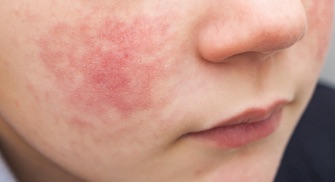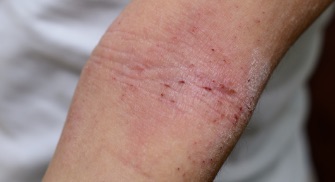
Understanding eczema
Eczema may be more common than you think
Not an actual patient. Symptoms illustrated.
What is eczema
(atopic dermatitis)?
Atopic dermatitis, the most common form of eczema, is a chronic (recurring) inflammatory skin condition that affects up to 9.6 million children and 16.5 million adults in the US.
Appearance and symptoms of atopic dermatitis
Eczema affects people of all ages and can appear on other locations on the body as you get older. Symptoms include redness, irritation, and itching. When the skin barrier is compromised, it can lose moisture which weakens the skin’s ability to protect. Uncontrolled itch that increases scratching can disrupt the skin even more and increase the risk of exposure to irritants and infection.



Not actual patients.
Consider gentle products with moisturizing properties to treat eczema-prone skin.

Not an actual patient. Symptoms illustrated.
Causes
While the exact cause of eczema is unknown, different genetic and environmental factors may affect eczema, and triggers vary from person to person.
Can diet affect eczema?Yes, but eczema is highly influenced by genetics and other environmental factors, not just diet.
Do only kids get eczema?Eczema symptoms can first appear at any age.
Will eczema go away with the right treatment?Eczema is a lifelong condition that needs ongoing symptom management.
Does eczema look the same on everyone?Eczema can appear on skin almost anywhere. And how it looks and feels can vary from person to person.
If you’re looking for a treatment option for your child’s eczema that’s not a steroid, you’re not alone.

In a survey of 200 patients and parents of patients with eczema,
of parents were worried about topical steroid use on their child’s skin*
Actor portrayal.
*Based on results of a 1998 survey administered to 200 patients or parents of patients with atopic eczema attending the dermatology outpatient department at the Queen’s Medical Centre in Nottingham.
Don’t suffer with symptoms of atopic dermatitis
Talk to your healthcare provider about where and how your symptoms of eczema (atopic dermatitis) are affecting you and ask if treatment with ZORYVE may be right for you.
Sign up for updates about ZORYVE
Get UpdatesTalk with your
dermatology provider
Not sure how to talk about your or your little one’s atopic dermatitis? See our helpful Appointment Guide.
USE THE GUIDE